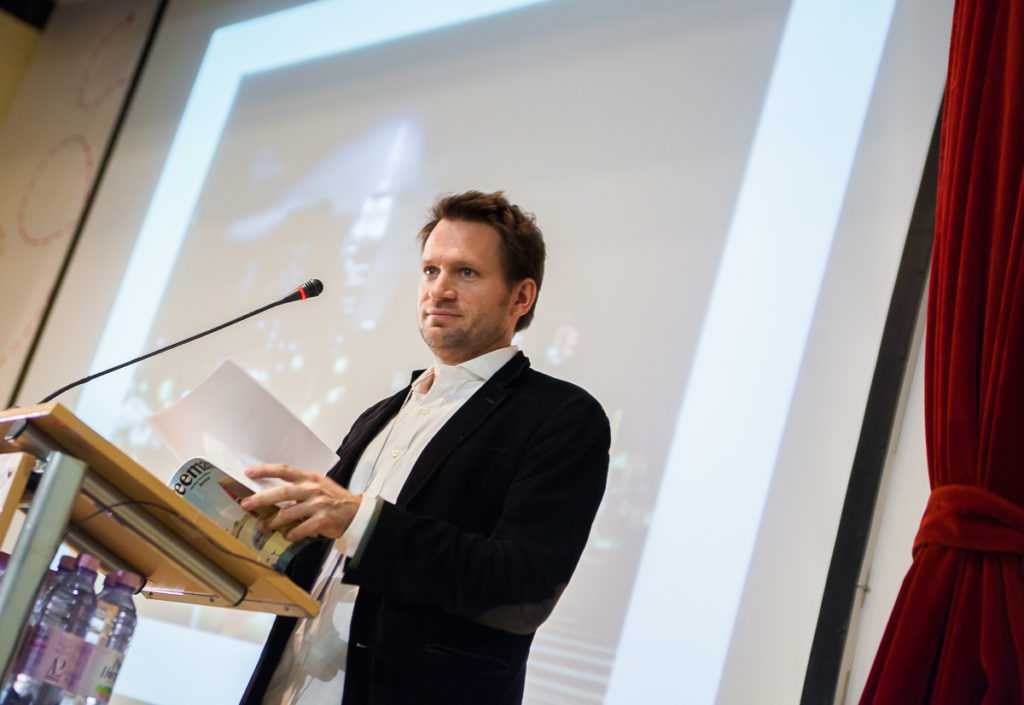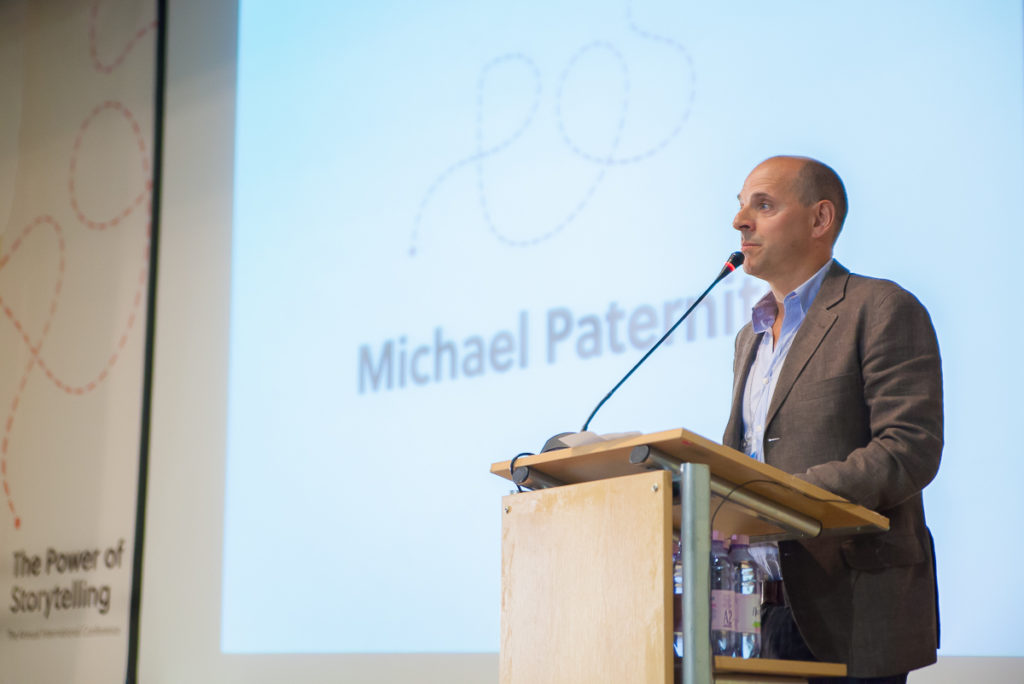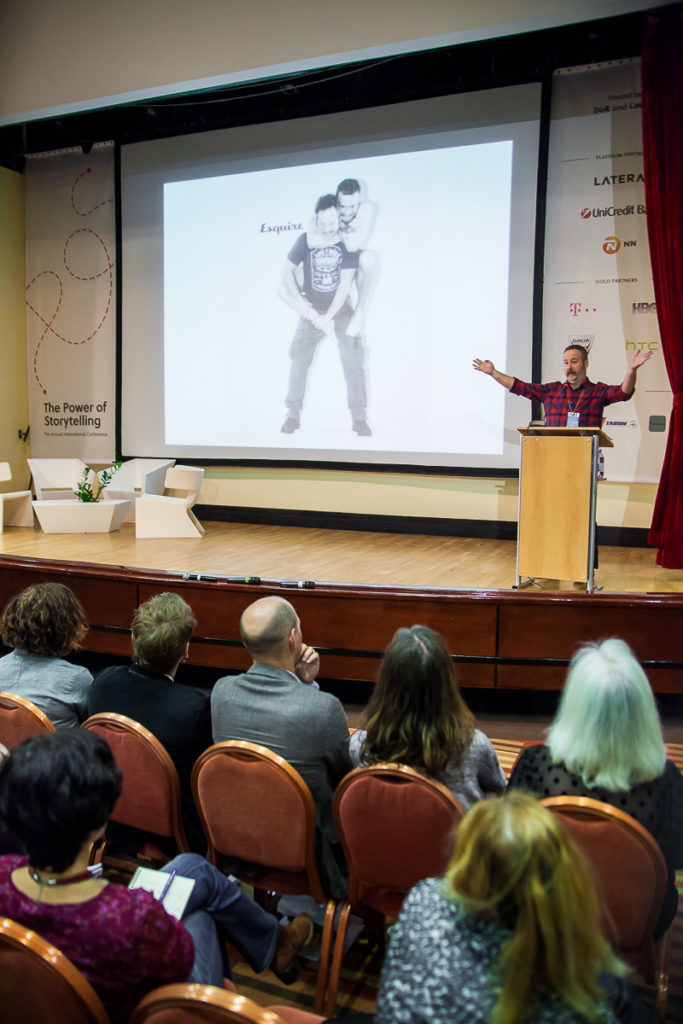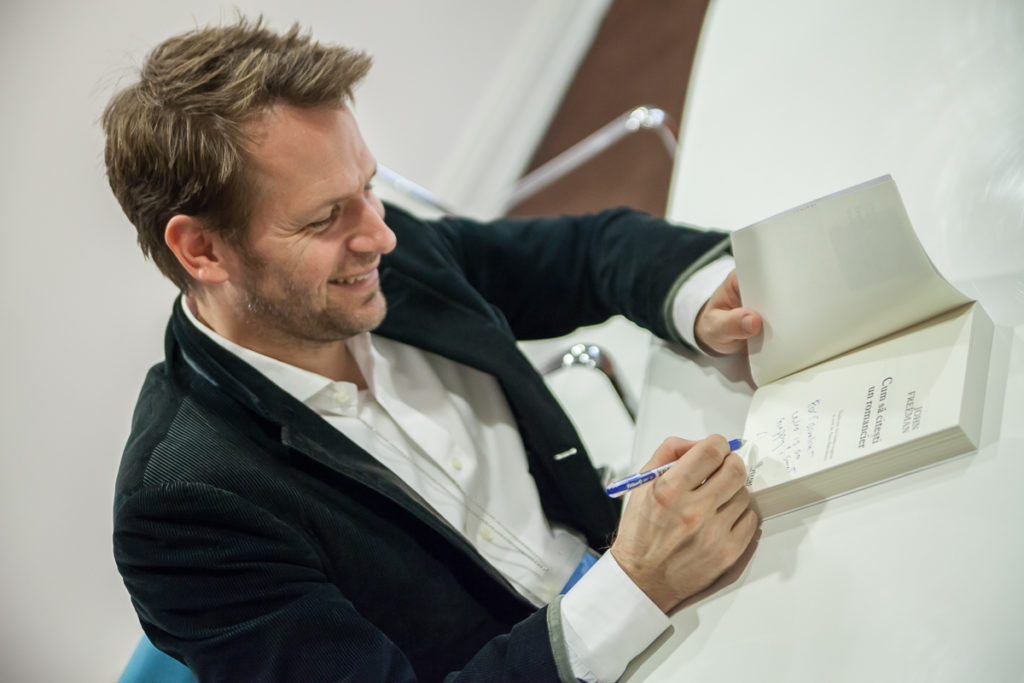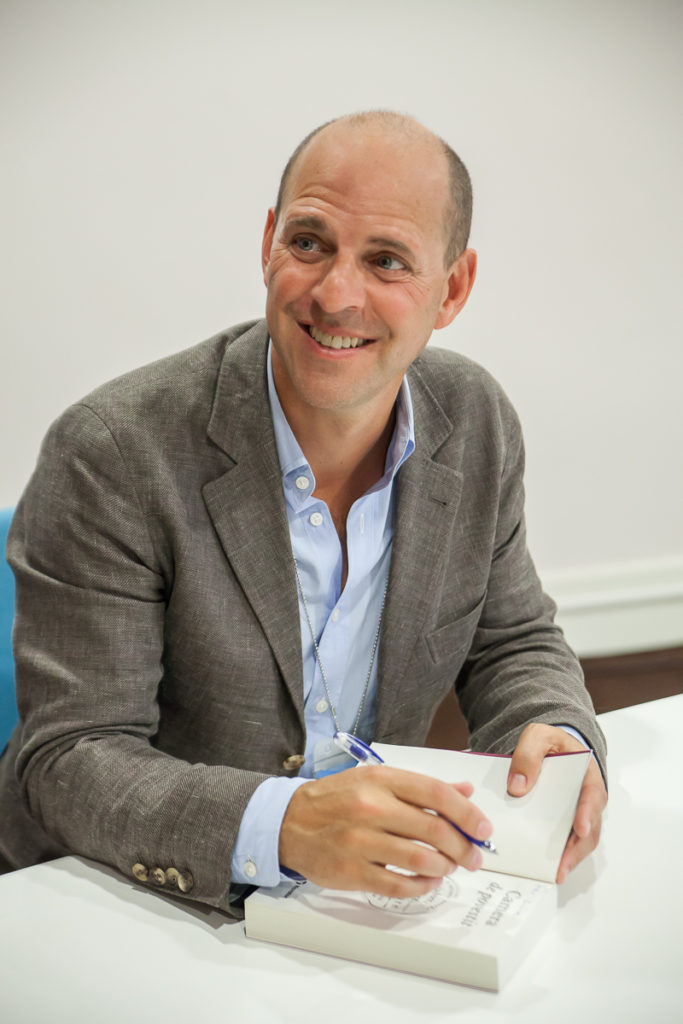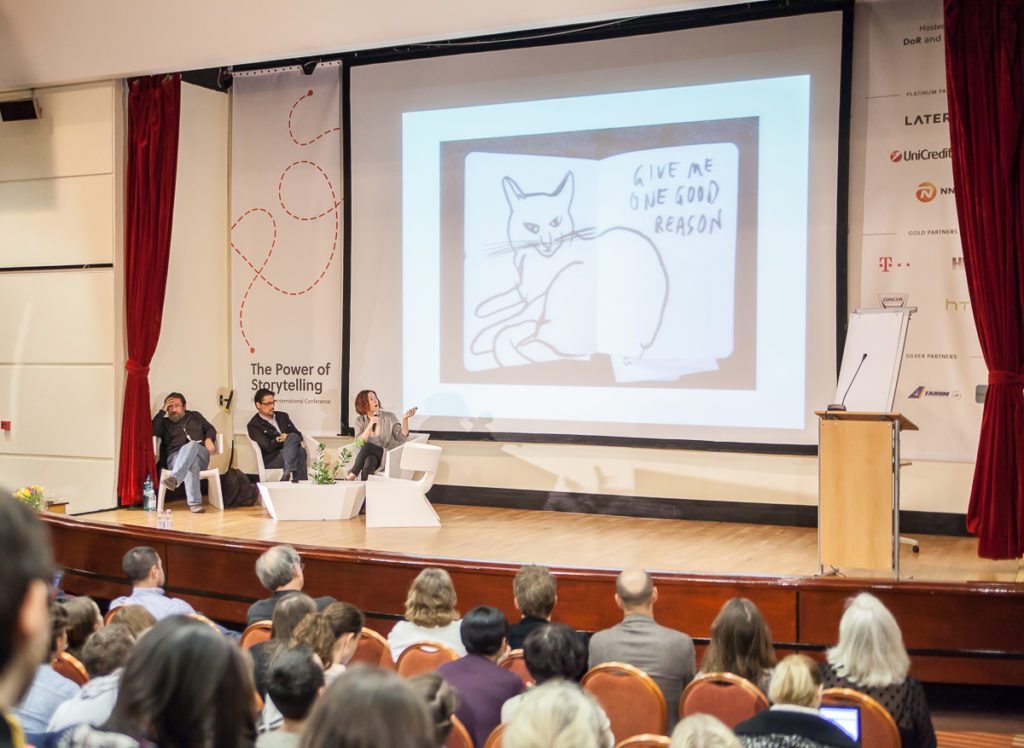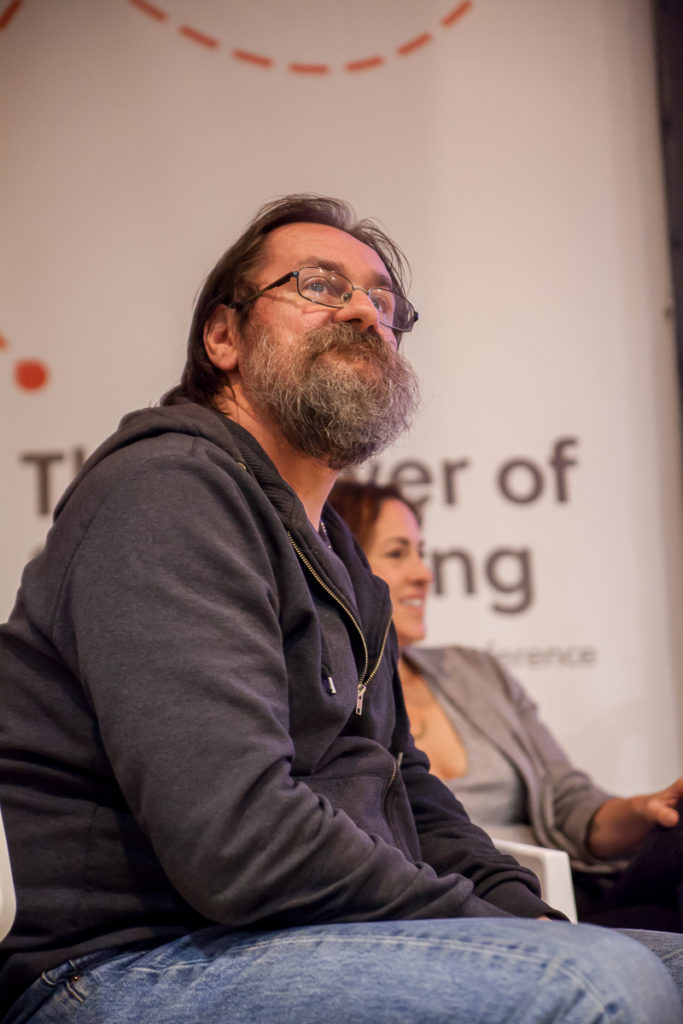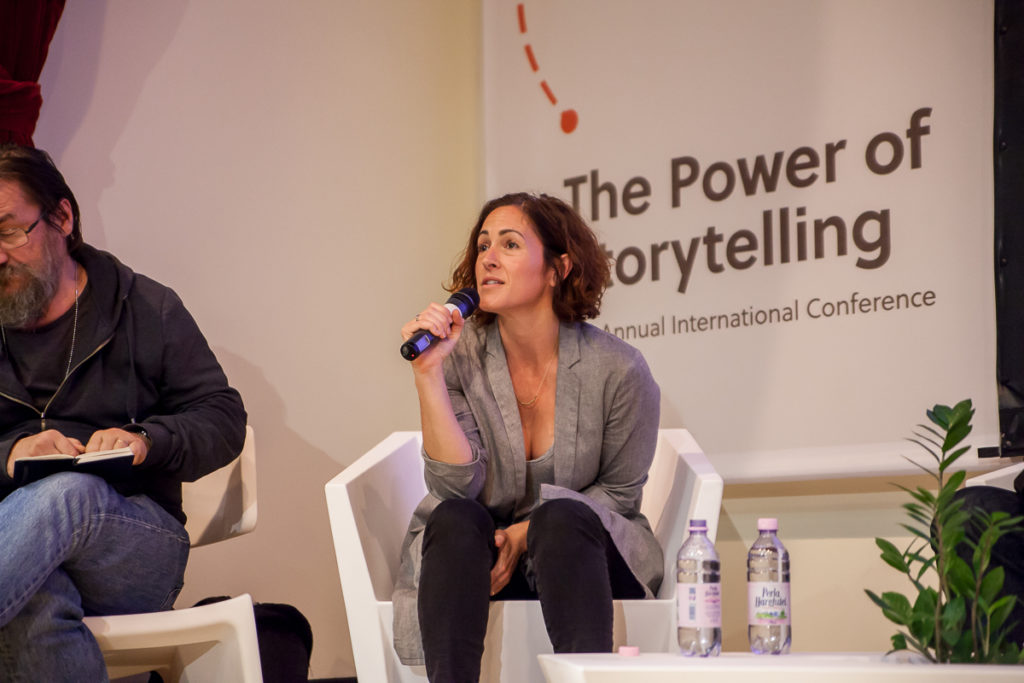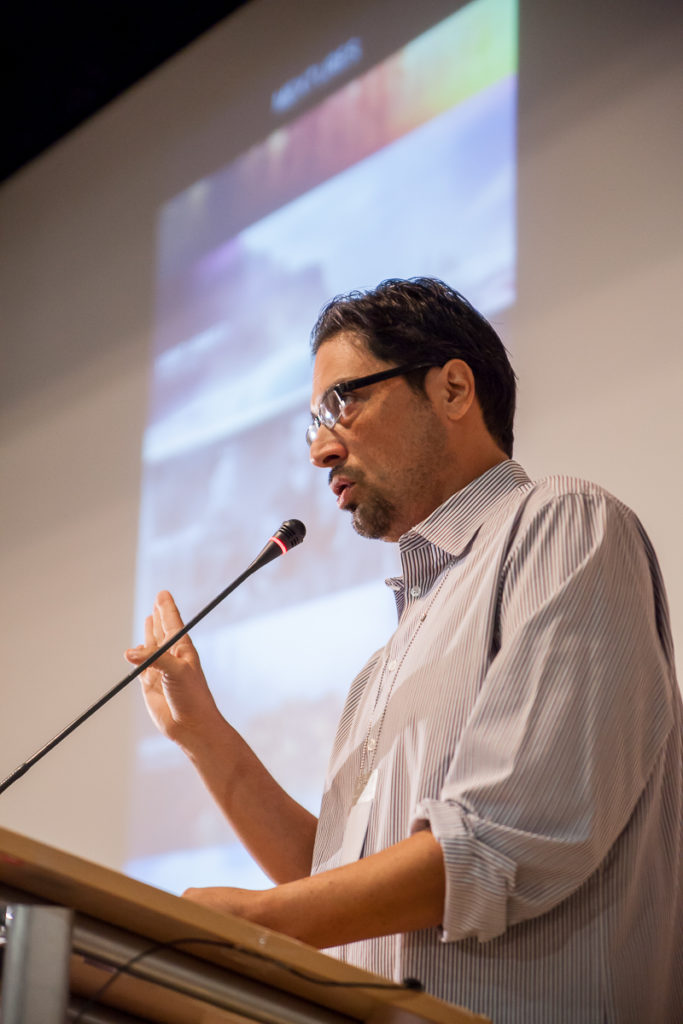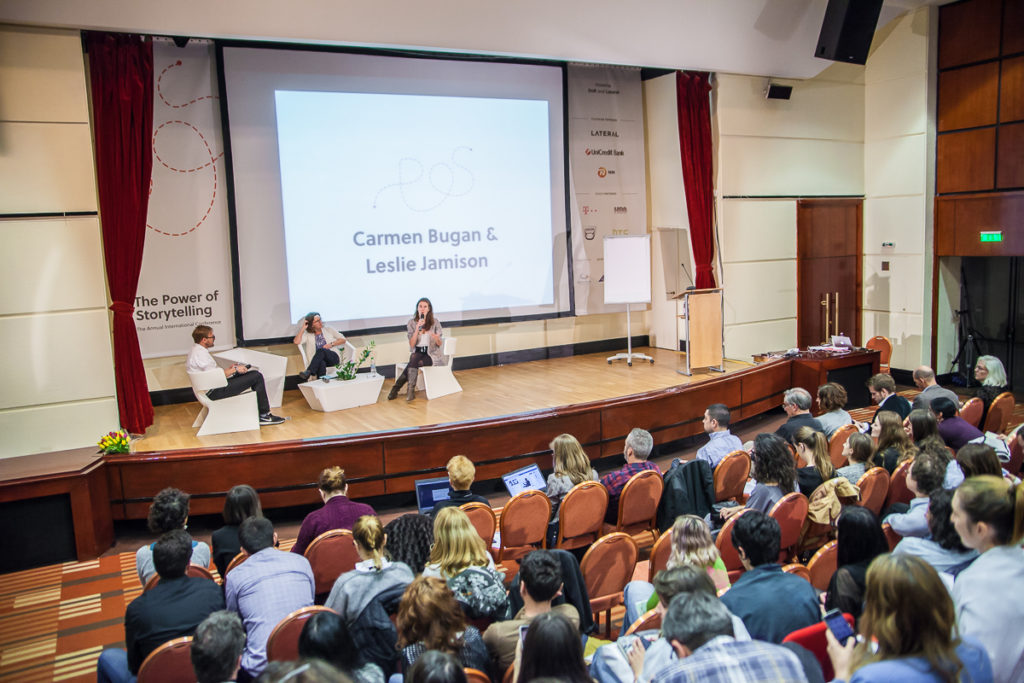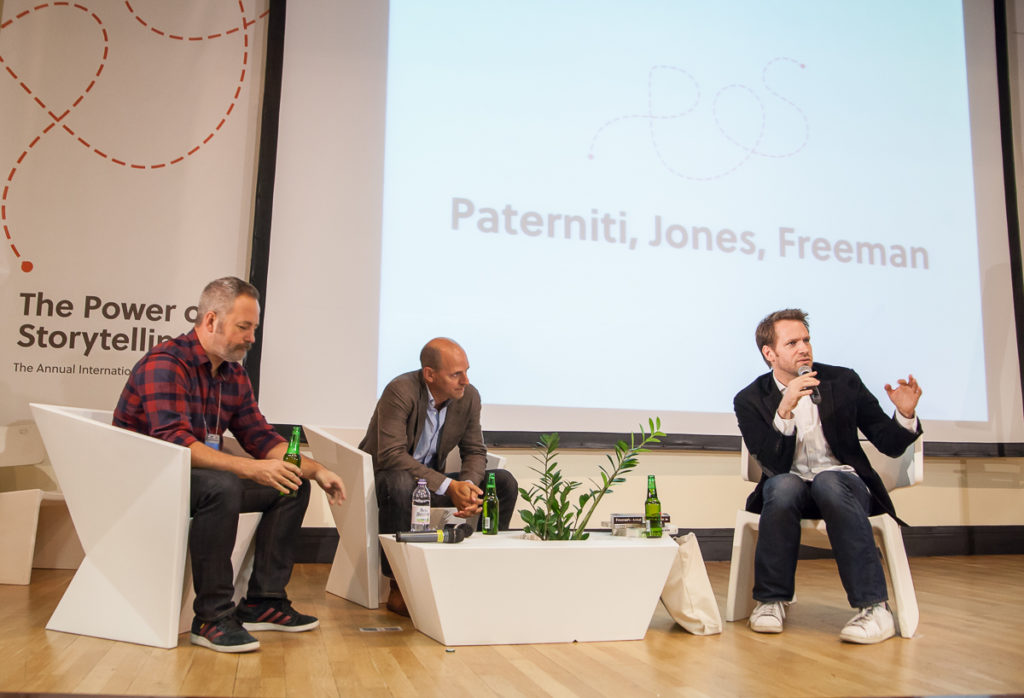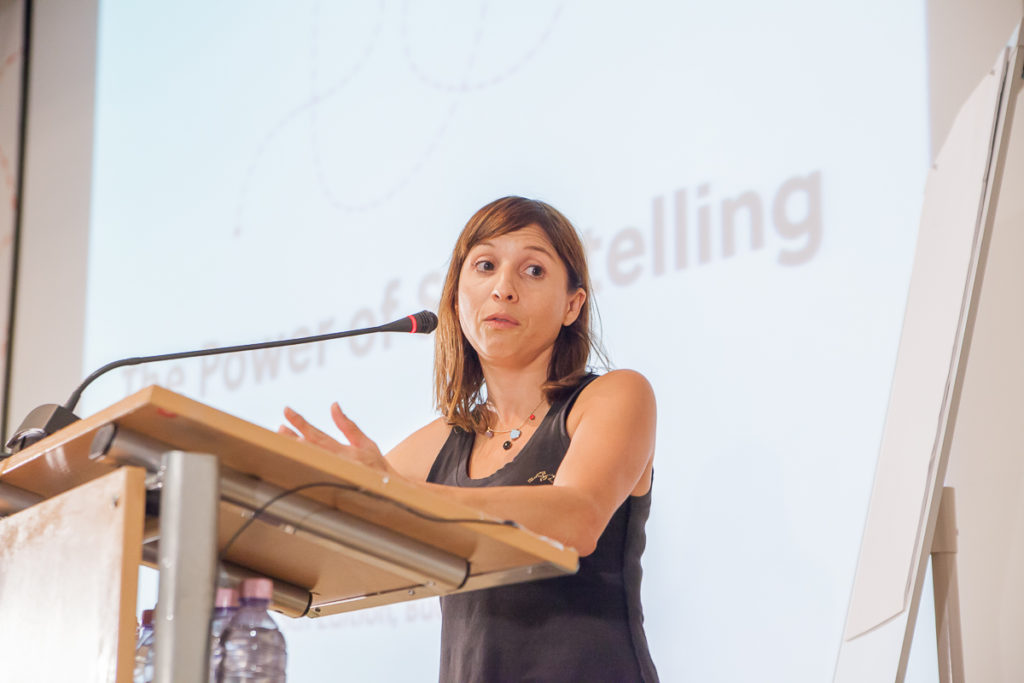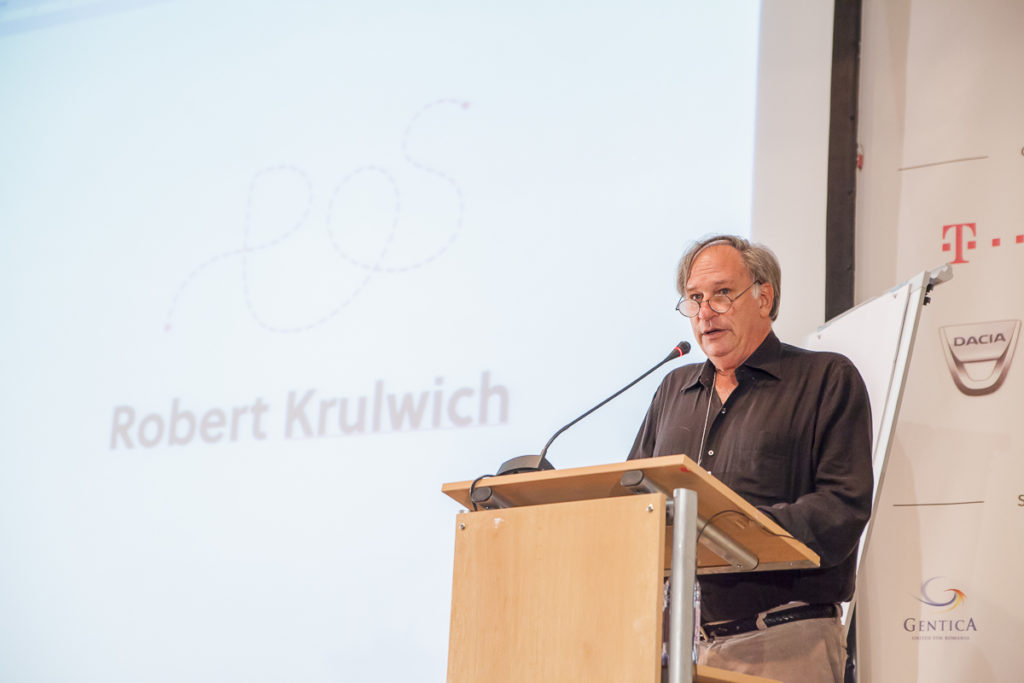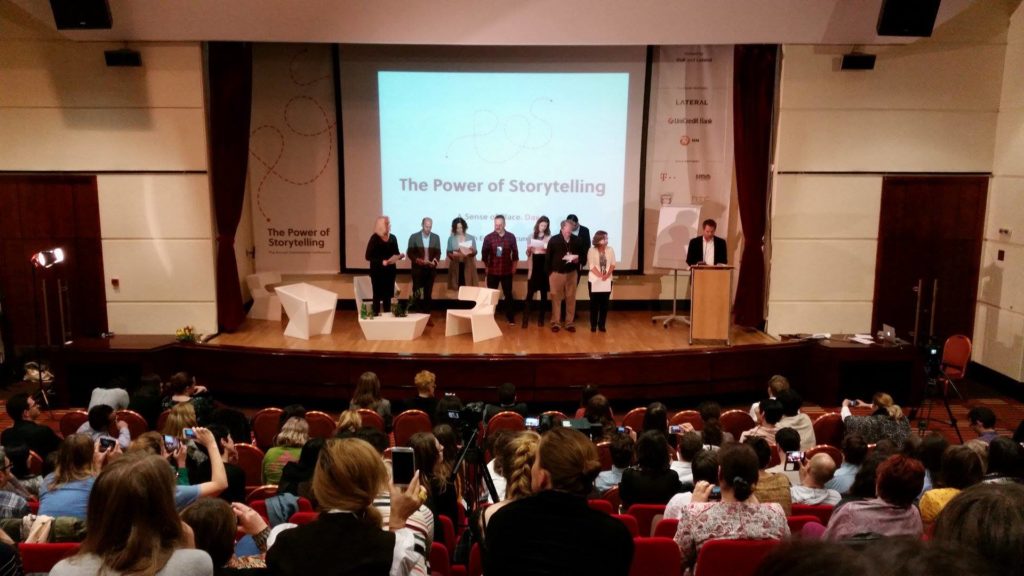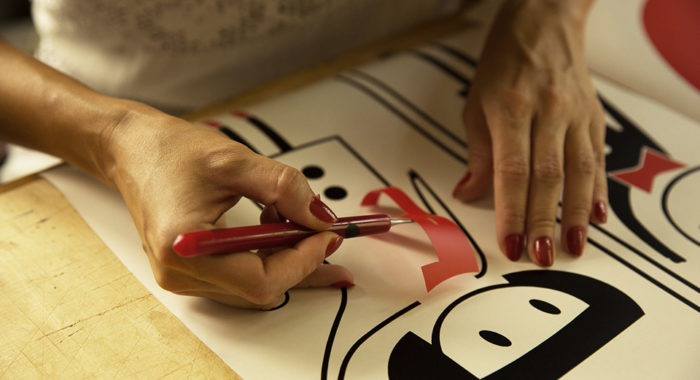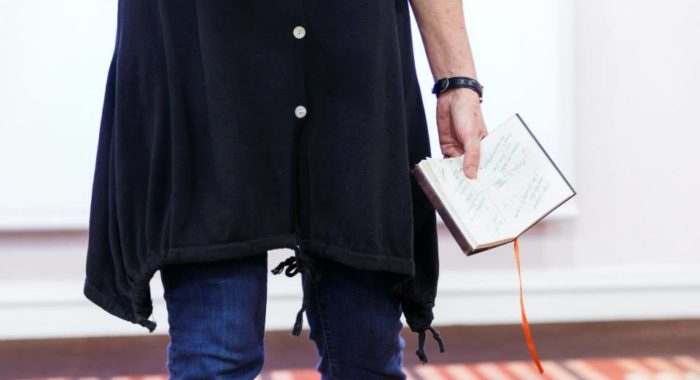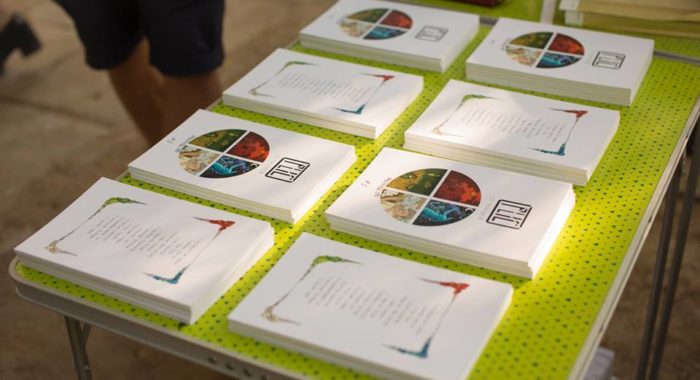The fifth edition of The Power of Storytelling international conference brought on stage amazing writers and editors, award winning visual storytellers and artists, audio magicians and story-innovators who shared craft tips, story-wisdom, personal stories and insights into their work process.
Here are the main takeaways from the second and final day of the Bucharest event:
John Freeman discussed why place is absent in so much fiction and writing in general nowadays. He also read a short story he wrote earlier this week, linking this question to urban development, the rise of the internet and creating new realities.
•The effect of decentralism in Western cities has been catastrophic. There is this idea of maximum efficiency that depends on optimized living. Speed is a neutral value. There’s terrible loneliness in so many urban environments in the West.
•What we find beautiful has moved away from nature to an urban sublime.
•We live in a manufactured environment. We live in a world of needs much larger than our own. As writers, we need to disassemble that.
Michael Paterniti followed with a keynote on projecting stories and how when we write, we actually move between worlds.
Michael started by sharing a story on his reporting from Burma, which later became Myanmar, and a charming bookstore he found there that helped him understand the place better. This bookstore included a memoir called Elephant Bill by J.H. Williams, about a man who spent 25 years living with elephants in the mountains and forests of Burma. There, he trained them to haul teak logs out of the isolated jungles, but what he discovered was how important it is to treat those majestic creatures with respect towards their sensitivity and intelligence.
•[Williams] was writing about stories and writers. And he was writing as if he was speaking directly to me. And what he made me realize was you can only learn from experience.
•It wasn’t just Elephant Bill‘s voice, it was the simple metaphor. For people like us here today, who love the mechanics of narrative, the story really IS an elephant. We have to humble ourselves and learn.
•Our jungle journey includes taking the bus, the plane, or just crossing the lawn at your neighbor’s house. We say “hello” to a stranger and by being there we begin.
•Suddenly, we’re lost in this other world, slick and glimmering. What do we see there and what do we make of it? What is that alchemy? I wish I knew the answer, because I’ve been doing this for a while and each story and book I write seems to kill me a little bit. Each one depletes me and yet leaves me refreshed.
As Chris Jones got on stage and started his speech, the whole room burst into laughter. “Always good to be in Romania, the country without men”, he began to everyone’s delight.
“I will make two promises out loud – first, this year there will be no crying, and second, this is going to be my last time here as a speaker. I feel like the needy boyfriend who keeps calling you,” Chris said, while promising he will return as a participant though. In the meantime, he left us with some invaluable advice and funny stories.
•I don’t need to scold you on phones and the dangers of the internet. It makes it so easy to stay at home, that you can pretend you’re a part of stuff. It gives you this illusion of action and participation.
•On seeing the Northern Lights during a particularly rough trip to Iceland: “When you see the Northern Lights like that, like they howl, it made me realize there are no substitutes for actually being there, for actually going.
•We made the effort to be here today, to come. It’s not easy. I got off my comfortable couch, went to Toronto, flew to Frankfurt, Germany, then to Bucharest. I earned this experience – but that’s a selfish feeling too. I’m actually lucky to be here.
•Louis CK has a great bit about how humans are the only beings that get to die in bed, surrounded by the people they love. When that happens, I don’t think I’m gonna sit there and go “I wish I spent more time on the internet”. I think I’m gonna regret the places I didn’t go, the people I didn’t connect with properly.
•I’m leaning out the door of the internet. I feel like I’m not alone in this, like there’s this analogue rebellion. People are rejecting eBooks, people are excited about the new Star Wars movie, records are making a big comeback in the U.S.. I think people want real experiences.
During the break, the participants were able to catch John Freeman and Michael Paterniti in the conference bookstore and ask them to sign their books.
Right after lunch, we were lucky enough to have Dan Perjovschi, Richard Koci Hernandez and Wendy MacNaughton together on stage, during an engaging panel on the importance of showing your work.
Dan said that when he’s working on a project, he puts himself in the situation of seeing things. “I’m like a hunting drone, I can see you all with bubbles above your heads. It’s an intense experience, I need breaks between projects and I need to do nothing for a while – except watching TV and enjoying very bad movies”.
•He shared how, during his time in school in communist Romania, he discovered a passion for drawing cartoons. “The teachers never assimilated this to a creative thing. And then it took me 10 years to get to that stage. It was a painful, long process – I made a lot of bad installations until I reached a certain language I felt comfortable with”.
•Art hit us at once after the Revolution in Romania – we had to navigate a lot of information we hadn’t gotten before. It was a process of understanding and re-learning. The solution to this was sharing the information.
•The drawings don’t just pop up in my head – sometimes they do, but for every 200 drawings maybe 10 of them will make it on the wall.
•My skill came by practice – I was never good in theory. I experiment a lot. I learn from my own mistakes.
•I don’t think you need to sacrifice anything for art, but if I look at my life, it’s not a normal life. My wife and I sleep on a mattress, we never had a holiday, but I don’t perceive that as a sacrifice. The process is linked to life, it’s a constant thing over the years. I’m comfortable with what I do.
Wendy then explained her creative process and how she got to be the superstar illustrator she is today.
•I juggle a lot of things, I never get bored. There is a time when you want to say “yes” to everything, because everything is interesting. I’m now learning how to say “no”.
•I found that in the morning I would roll over from bed and pick up the phone to check my comments or my mail – I decided I wouldn’t do that anymore, so I started drawing every morning instead. I start drawing what’s in front of me every day.
•Doing something in the morning that isn’t reactive was better, because I got to start on my own two feet, not on someone else’s feet.
•I am totally dependent on a piece of paper and a pen, on a computer and on my partner. A computer is just a tool and it can do what you want, as long as you don’t become the tool.
Richard followed by showing us his camera roll on his iPhone, including a selection of 42 photos he made since coming to Romania. We got to see how a stranger on the street became his unaware tour guide in Bucharest, as Richard explained and demonstrated it takes many, many tries to reach a good photograph.
•He was so slow and contemplative, and he would look at real estate posters, then he was just looking through a window. That’s my little journey with him.
•I shoot digitally, but my ultimate goal is to make it look analogue. My aesthetic is black and white. It’s a little bit griddy, a little bit dark.
•On using filters: You can’t put lipstick on a pig, don’t overlove the picture. When you have something good though, you should give it some care and loving.
•I want my photos to feel like maybe it was a real photograph, and maybe it was dropped and someone stepped on it, and then a taxi drove over it, and then you found it.
In the second part of our day we also heard from Carmen Bugan and Leslie Jamison on personal writing and using one’s own experience to portray something more universal. The discussion was led by the host of #Story15 and DoR editor, Cristian Lupsa.
•Leslie: I believe from the bottom of my heart than no life is boring. Look at the relationship with your parents! Everyone has parents, and there’s so much there!
•Carmen: Going from the historical to the personal, I thought there was something there that proved that history happens one person at a time.
•Leslie: I write down sensory information, I write down weird things from my life, conversations. When I pick up that journal again in a few years, I know it will feel like such a revelation.
•Carmen: Writing for me is like making bread, it’s a very domestic thing. The language is the flour, you put the water (tears and feelings), but you also need salt, which is your own voice.
Later in the evening, the audience was surely entertained during a panel with three narrative superstars: Chris Jones, Michael Paterniti and John Freeman. The three discussed aspects of the writing life and shared tips for young writers.
•Chris: Criticism is good, but there’s this assumption that we, writers, actually want to do bad work and we would if the critics weren’t there. Good criticism comes from a place of generosity, from a place of celebrating something that you love. It’s always been offensive that the only ones saving the world from a cataclysm of shit are the critics.
•Chris: The good writers I know are professionals, they’re disciplined and they set time aside for writing. They care so deeply about this stuff, and they try the hardest.
•John: Writers’ obsessions can break a story open. They can bring themselves into the piece, not to be the topic, but to be the optic.
•Chris: Every writer has a different process. Young writers fall into that trap of “I really like that person so I’m going to do that”. You will steal other people’s voices in the beginning, and you will steal people’s ideas, but eventually you have to find your own voice.
•Michael: Be here now, take your time and you will do something meaningful.
Podcast genie Starlee Kine then surprised the audience as she took the stage to announce that she’ll be speaking during the Cluj conference (October 14th) and that she needs our help: Starlee wants us to help her find a mystery for her to solve in Romania, for her popular Mystery Show. Let’s help her out!
Last but definitely not least, Robert Krulwich closed our two-day conference with a heartwarming, humorous keynote on radio storytelling, curiosity, asking stupid questions, alligators and octopuses – because they sometimes behave so strangely (ha!).
•This technology thing came up and the idea that we, radio people, might have a chance to become a sort of literature is so peculiar that I still haven’t gotten used to it.
•Finding a story is in the fundamentals, in the small choices that you make all the time – this is where the job really is.
•If you’re going to be a gambler in this business, you have to place yourself opposite the “normal”, and it doesn’t always work.
•I’m totally convinced you can mix science and mystery in a general public show. The easiest way to do this is to just do a story that is innately elegant.
Our two days of magic and inspiration ended with a surprise from the speakers themselves. Following Jacqui Banaszynski initiative to create a live poem with the help of the audience the previous day, our guests decided to each recite a part of the final product on stage.
Thank you all for coming to our conference, a big thanks to all our sponsors and partners, to the speakers for taking the time to be with us and to the great team who made #Story15 possible! See you all next year!
